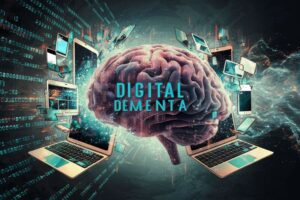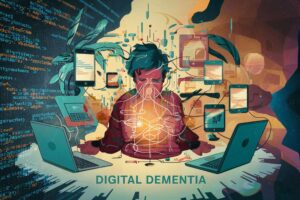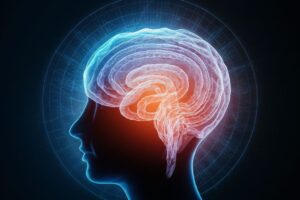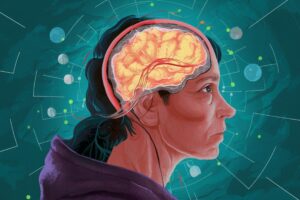What are the Causes and Symptoms of ‘Digital Dementia’?
Digital devices have become an integral part of our daily lives, providing convenience, connectivity, and access to a vast amount of information. However, with the increasing reliance on technology, concerns about its potential impact on cognitive function have arisen.
This article explores the phenomenon known as “Digital Dementia” – a term coined to describe the cognitive decline associated with excessive digital device usage.
By delving into the causes, symptoms, and effects of Digital Dementia, as well as preventive measures and treatment options, we aim to shed light on this emerging concern and provide valuable insights for individuals, families, and professionals navigating the digital age.

Table of Contents
ToggleDefining Digital Dementia
Welcome to the era of digital overload, where our constant connection to smartphones, tablets, and computers may be taking a toll on our brains. Digital dementia, a term coined by neuroscientist Manfred Spitzer, refers to the cognitive decline and memory deterioration caused by excessive use of digital devices. While technology undoubtedly brings numerous benefits, it’s important to understand the potential risks it poses to our mental faculties.
Historical Context and Emerging Concerns
In the not-so-distant past, the term “dementia” was reserved for older individuals afflicted with age-related cognitive decline. However, in today’s fast-paced and technology-driven world, we find ourselves facing a new form of cognitive impairment impacting individuals of all ages.
With children and adults spending increasing amounts of time engrossed in screens, concerns about the long-term effects of this digital obsession have emerged. It’s time we delve into the causes and symptoms of this modern-day phenomenon.
Read more about “Exploring the Latest Advances in Alopecia Treatment”
Understanding the Causes of Digital Dementia
Neuroplasticity and Cognitive Reserve
Our brains are remarkable organs capable of adapting and rewiring themselves. This ability, known as neuroplasticity, allows us to learn new skills and form memories. However, excessive reliance on digital devices may hinder the development of essential cognitive reserve, which acts as a form of mental resilience against cognitive decline. By relying on technology for tasks that could be mentally stimulating, we risk depriving our brains of the exercise they need to stay sharp.

Impact of Excessive Screen Time
We all know that too much screen time isn’t great for our eyes or posture, but its impact on our brain function is equally concerning. Research suggests that excessive screen time can negatively affect attention, memory, and problem-solving skills. Our brains can become so accustomed to the instant gratification of quick online searches and constant stimuli that we may struggle to concentrate, remember information, or think critically in offline situations.
Effects of Multitasking and Information Overload
In our fast-paced digital world, multitasking has become the norm, with multiple tabs open, notifications buzzing, and messages pouring in. However, science tells us that multitasking is more like rapidly switching attention between tasks, ultimately hindering our cognitive efficiency.
Furthermore, the constant bombardment of information and distractions from the digital realm can overwhelm our brains, leading to decreased productivity and cognitive strain.
Read more about “Emotional Numbness: The Hidden Epidemic and How to Break Free?”
Impact of Excessive Digital Device Usage on Cognitive Function
Deterioration of Memory and Attention Span
Perhaps one of the most noticeable effects of digital dementia is the decline in memory and attention span. With information only a few clicks away, we no longer rely on our own memory recall. This constant outsourcing of memory can weaken our ability to retain and recall information. Additionally, the constant distractions and fragmented attention caused by digital devices can make it harder for us to concentrate and stay focused for prolonged periods.

Decline in Problem-Solving Abilities
Remember those challenging puzzles and brain teasers that used to exercise our problem-solving skills? Well, excessive digital device usage may be bypassing the need for such mental gymnastics. When we constantly turn to search engines or calculators for answers, our brains may lose the opportunity to engage in critical thinking and develop problem-solving capabilities. Over time, this lack of mental exercise can lead to a decline in our ability to analyze and solve complex problems.
Impaired Social and Emotional Skills
While digital devices have made it easier than ever to connect with others, excessive reliance on them can have adverse effects on our social and emotional skills. A growing body of research suggests that spending too much time online can lead to social isolation, decreased empathy, and difficulty forming meaningful relationships. In an era where emojis have replaced genuine emotions, it’s crucial to recognize the potential impact on our ability to understand and connect with others.
Read more about “How Focused Thinking Can Transform Your Body?”
Symptoms and Signs of Digital Dementia
Memory Loss and Forgetfulness
Are you finding it increasingly difficult to remember important dates, names, or even where you put your keys? Memory loss and forgetfulness can be key indicators of digital dementia. If you are relying heavily on digital devices to store and recall information, it may be time to reassess your digital habits and give your brain a chance to exercise its own memory muscles.

Difficulty Concentrating and Focusing
Do you struggle to stay engaged in tasks that require sustained attention? The constant distractions and quick-fix stimuli of the digital world can make it challenging to concentrate and focus for extended periods. If you find your mind wandering off course more often than not, digital dementia may be playing a role.
Decreased Analytical Thinking
Have you noticed a decline in your ability to think critically and analyze information? Excessive reliance on digital devices for answers and information can prevent our brains from engaging in the higher-level thinking necessary to evaluate, synthesize, and make informed decisions. If your problem-solving skills have taken a hit, it’s time to consider the impact of digital dementia.
Impaired Motor Skills
Although it may seem unrelated, impaired motor skills can also be a sign of digital dementia. Spending excessive time with our eyes glued to screens can lead to poor posture, decreased physical activity, and a general lack of motor coordination.
If typing, handwriting, or performing basic physical tasks has become more challenging, it might be time to reassess your digital habits and get your body moving.
While digital devices offer many conveniences and benefits, it’s crucial to strike a balance and be mindful of our overall cognitive health.
By recognizing the causes and symptoms of digital dementia, we can take proactive steps to ensure our brains remain sharp and resilient in the digital age. So, let’s put down our devices, engage in offline activities, and give our brains the exercise they need to keep us at our mental best.
The Role of Technology Addiction in Digital Dementia
Understanding Internet and Device Dependency
In today’s digital age, it’s all too easy to become dependent on our devices. Whether it’s constantly checking our smartphones for notifications or spending hours glued to our computers, this reliance on technology can contribute to digital dementia.

The more we rely on technology, the less we rely on our own cognitive abilities, leading to a decline in memory, attention, and critical thinking skills.
Impact of Social Media and Online Gaming
Social media and online gaming have become integral parts of many people’s lives, especially among the younger generation. However, excessive use of these platforms can have detrimental effects on our mental faculties.
Constant scrolling through social media feeds or spending hours immersed in online gaming can lead to decreased focus, impaired memory, and an overall decline in cognitive function.
Escapism and Avoidance Behaviors
One reason people may become addicted to technology is to escape from the stresses and pressures of daily life. However, relying on technology as a means of avoidance can have consequences. Instead of addressing and coping with real-life challenges, we retreat into the digital world, neglecting the development of important cognitive skills. This avoidance behavior further exacerbates the risk of digital dementia.
Effects of Digital Dementia on Children and Adolescents
Neurological Development and Digital Overexposure
Children and adolescents are particularly vulnerable to the effects of digital dementia due to their developing brains. Excessive exposure to screens and technology can hinder neurological development, leading to difficulties in attention, memory, and problem-solving skills. It’s crucial to limit their screen time and encourage other activities that promote healthy brain development.
Academic Performance and Learning Disabilities
Digital dementia can have a significant impact on academic performance. Students who spend excessive time on devices may experience difficulties with focus, comprehension, and information retention. This can lead to learning disabilities and a decline in academic achievement, as the brain’s ability to process and integrate information weakens with diminished cognitive skills.
Social and Behavioral Implications
The effects of digital dementia extend beyond academic performance. Excessive screen time can impede social development, as face-to-face interactions and social skills take a backseat to virtual connections. Additionally, children and adolescents who spend excessive time on digital devices may exhibit increased irritability, decreased attention span, and difficulty with emotional regulation.
Preventive Measures and Strategies to Combat Digital Dementia
Establishing Healthy Digital Habits
To combat digital dementia, it’s vital to establish healthy digital habits. This includes setting boundaries on screen time, implementing device-free zones, and practicing digital detoxes regularly. By consciously limiting our reliance on technology, we can ensure that our cognitive abilities remain sharp and prevent the onset of digital dementia.

Encouraging Physical Activity and Outdoor Engagement
Engaging in physical activities and spending time outdoors not only promotes overall well-being but also helps counteract the negative effects of excessive technology use. Exercise and outdoor activities stimulate brain activity, improve memory, and enhance cognitive function. Encouraging regular physical activity can be an effective preventative measure against digital dementia.
Promoting Cognitive Stimulation and Brain Training
Just as physical exercise keeps our bodies fit, cognitive stimulation keeps our minds sharp. Engaging in activities that challenge our brains, such as puzzles, reading, or learning new skills, promotes cognitive function and can serve as a protective measure against digital dementia. By consistently challenging ourselves mentally, we build resilience and maintain our cognitive abilities.
Treatment and Rehabilitation for Digital Dementia
Cognitive and Behavioral Therapy
For individuals already experiencing the effects of digital dementia, cognitive and behavioral therapy techniques can be beneficial. These therapies focus on improving cognitive function and fostering healthy behavioral patterns. By working with a therapist, individuals can develop strategies to address the cognitive decline caused by excessive technology use.
Rehabilitation Programs and Interventions
Specialized rehabilitation programs and interventions tailored to digital dementia can help individuals regain cognitive abilities. These programs often involve a combination of cognitive exercises, memory training, and behavior modification techniques. With proper guidance and support, individuals can regain control over their cognitive functions and limit the progression of digital dementia.
Supportive Measures and Lifestyle Changes
Supportive measures and lifestyle changes play a crucial role in managing digital dementia. This includes creating a supportive environment free from excessive technological distractions, encouraging social interactions, and promoting overall well-being through a balanced lifestyle.
By prioritizing self-care and making conscious choices about technology usage, individuals can better manage and mitigate the effects of digital dementia.
In conclusion, as digital devices continue to play a significant role in our lives, it is crucial to strike a balance between their benefits and potential risks. Understanding the causes and symptoms of Digital Dementia empowers us to make informed decisions about our digital habits and take proactive steps to protect our cognitive health.
By implementing preventive measures, encouraging healthy digital habits, and seeking appropriate treatment if needed, we can mitigate the impact of excessive device usage and ensure a healthier relationship with technology.
Let us strive for a digital landscape that promotes cognitive well-being and supports our overall mental health in the years to come.
FREQUENTLY ASKED QUESTIONS
1. Can digital devices actually cause cognitive decline?
Yes, excessive digital device usage can contribute to cognitive decline. Prolonged screen time, multitasking, and information overload can negatively impact memory, attention span, problem-solving abilities, and social skills. This phenomenon is referred to as Digital Dementia.
2. How can I determine if I or someone I know is experiencing Digital Dementia?
Common symptoms of Digital Dementia include memory loss, difficulty concentrating, decreased analytical thinking, and impaired motor skills. If you or someone you know exhibits these signs, especially in conjunction with excessive digital device usage, it may be a cause for concern.
3.Are children and adolescents more susceptible to Digital Dementia?
Yes, children and adolescents are particularly vulnerable to Digital Dementia due to their developing brains and increased exposure to digital devices. Overexposure to screens during critical stages of neurological development can have lasting effects on cognitive function, academic performance, and social and behavioral skills.
4. What can I do to prevent or combat Digital Dementia?
There are several preventive measures and strategies to combat Digital Dementia. These include establishing healthy digital habits by setting screen time limits, engaging in physical activities and outdoor play, promoting cognitive stimulation through reading or puzzles, and seeking professional help if symptoms persist. Implementing these measures can contribute to maintaining cognitive health and promoting a balanced digital lifestyle.


